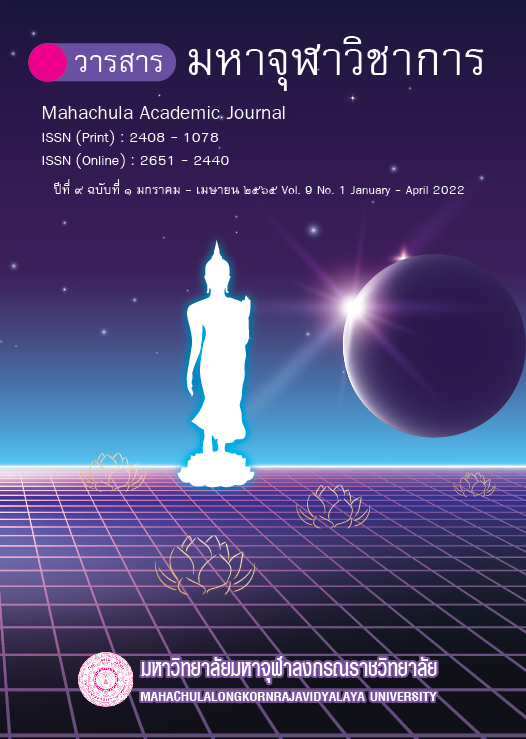Guidelines for Development of Cultural Tourism in Wat Ko Community Mueang District Phetchaburi Province
Main Article Content
Abstract
400 tourists traveling in Wat ko community. And, the qualitative research methodology was also used. The data were collected by using a structured in-depth interview from the community leaders, wisdom owners, shop owners, Phetchaburi culture office, local officials. The abbots of Wat Ko, and community representatives, a total of 9 people. Then analyze all the data obtained by using frequency, percentage, mean, standard deviation, and content analysis. The research results were as follows: the cultural attractions in Wat Ko were consisting of architecture, painting, and the inheritance of Muang Phet craftsmen's family work, the composition of cultural attractions in Wat Ko were attractiveness, the ability to organize tourism programs, accessibility, activities, facilities, and tourism attraction aspect, and propose guidelines for the development of cultural tourism in Wat ko found related agencies with tourism should be organize activities together, create a tourism identity to excellence by organizing traditions, showing the way of life of the community, various architectures, without leaving the original identity; but to insert modern tourism forms.
Article Details

This work is licensed under a Creative Commons Attribution-NonCommercial-NoDerivatives 4.0 International License.
References
กมลวรรณ ถนอมเงิน. “แนวทางการพัฒนาการท่องเที่ยวเชิงวัฒนธรรม กรณีศึกษาพระธาตุพนมจำลอง อำเภอห้วยเม็ก จังหวัดกาฬสินธุ์”. การศึกษาอิสระบริหารธุรกิจมหาบัณฑิต. สาขาวิชาการจัดการการท่องเที่ยว : มหาวิทยาลัยขอนแก่น, ๒๕๕๔.
การท่องเที่ยวแห่งประเทศไทย. สถานการณ์การท่องเที่ยว. กรุงเทพมหานคร : การท่องเที่ยวแห่งประเทศไทย, ๒๕๖๑.
ชวลิต ตั้งสมบูรณ์กิตติ. “การศึกษาการจัดการท่องเที่ยวทางวัฒนธรรมภายในตลาดเก่าบ้านแหลม จังหวัดเพชรบุรี”. การค้นคว้าอิสระบริหารธุรกิจมหาบัณฑิต. สาขาวิชาการประกอบการ : มหาวิทยาลัยศิลปากร, ๒๕๕๔.
เทิดชาย ช่วยบำรุง. การท่องเที่ยวไทยนานาชาติ ปี พ.ศ. ๒๕๕๐ : รวมบทความวารสารวิชาการ. พิมพ์ครั้งที่ ๒. กรุงเทพมหานคร : สถาบันวิจัยเพื่อพัฒนาการท่องเที่ยวไทย สำนักงานกองทุนสนับสนุนการวิจัย (สกว.). ๒๕๕๒.
ประพัทธ์ชัย ไชยนอก. “แนวทางการพัฒนาการท่องเที่ยวเชิงวัฒนธรรม: กรณีศึกษาบ้านด่านซ้าย อำเภอด่านซ้าย จังหวัดเลย”. ปริญญาศิลปศาสตรมหาบัณฑิต. สาขาวิชายุทธศาสตร์การพัฒนา : มหาวิทยาลัยราชภัฏเลย, ๒๕๕๓.
พยอม ธรรมบุตร. “แนวทางพัฒนาการท่องเที่ยวเชิงสร้างสรรค์บนพื้นฐานอัตลักษณ์และวิถีไทยแบบบูรณาการอย่างยั่งยืนในเขตบางกอกน้อย กรุงเทพมหานคร”. วารสารวิชาการ. ปีที่ ๑๓ ฉบับที่ ๓ (กันยายน - ธันวาคม ๒๕๖๒): ๖๕-๗๕.
รัฐนันท์ พงศ์วิริทธิ์ธร และภาคภูมิ ภัควิภาส. “แนวทางการพัฒนา การท่องเที่ยวเชิงวัฒนธรรมชนเผ่าเพื่อความยั่งยืน”. Journal of Community Development Research 2013. ปีที่ ๖ ฉบับที่ ๑ (มกราคม – มิถุนายน ๒๕๕๖) : ๔๒-๖๐.
วรรณา ศิลปอาชา. ความรู้เบื้องต้นเกี่ยวกับการจัดการทรัพยากรการท่องเที่ยว หน่วยที่ ๑-๗. พิมพ์ครั้งที่ ๒. นนทบุรี : มหาวิทยาลัยสุโขทัยธรรมาธิราช, ๒๕๔๙.
สุชาดา รักเกื้อ. “แนวทางพัฒนาการส่งเสริมการท่องเที่ยวเชิงวัฒนธรรมของเทศบาลตำบลนครชุม อำเภอเมืองกำแพงเพชร จังหวัดกำแพงเพชร”. รายงานสืบเนื่องจากการประชุมวิชาการระดับชาติ. ครั้งที่ ๔ วันที่ ๒๒ ธันวาคม ๒๕๖๐ สถาบันวิจัย มหาวิทยาลัยราชภัฏกำแพงเพชร, ๒๕๖๐.
หยกทิพย์ และในสิงห์. “แนวทางการพัฒนาการท่องเที่ยวเชิงวัฒนธรรมของชาวภูไทบ้านห้วยหีบ อำเภอโคกศรีสุพรรณ จังหวัดสกลนคร”. การศึกษาอิสระบริหารธุรกิจมหาบัณฑิต. สาขาวิชาการจัดการ การท่องเที่ยว มหาวิทยาลัยขอนแก่น, ๒๕๕๔.
Cochran, W.G. Sampling Techniques. New York: John Wiley & Sons. Inc, 1953.
McKercher, B. and Hilary du Cros. Cultural Tourism: The Partnership between Tourism and Cultural Heritage Management. New York: The Haworth Hospitality Press, 2002.
Pelasol, J. Igcabugao: A Potential Tourist Destination in the Southern Part of Iloilo, Philippines. International Peer Reviewed Journal JPAIR Multidisciplinry Research is being certified for QMS ISO 9001:2008 by the Anglo Japanese American Registrars of the United Kingdom, 2012.
Pike, Steven D. Destination Marketing : an integrated marketing communication approach. Massachusetts United States : Butterworth-Heinemann. Burlington, 2008.
https://phetchaburi.mots.go.th/news_view.php?nid=364, [๑๘ พฤศจิกายน ๒๕๖๓].


